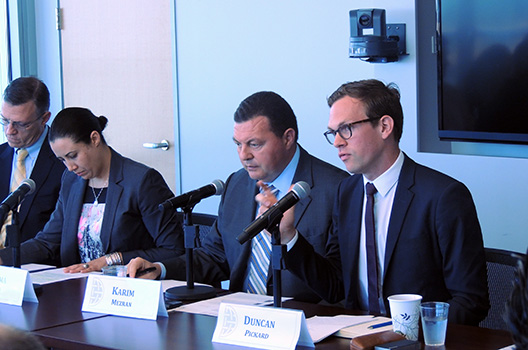 Although Tunisia’s democratic transition has been rocky, it presents what has been called the “best hope” among the Arab transition states. Elections scheduled for later this year are important in their own right, but are also viewed as a litmus test for the future of inclusive politics. On Wednesday, July 30, 2014, Hariri Center nonresident fellow Duncan Pickard spoke at an Atlantic Council event on the new political arrangement and how electoral politics will interact with Tunisia’s nascent institutions. Pickard, who is a constitutional advisor for Democracy Reporting International, was joined on the panel by Fatima Hadji of the National Endowment for Democracy to take a bird’s-eye view of the process. Hariri Center senior fellow Karim Mezran moderated the discussion.
Although Tunisia’s democratic transition has been rocky, it presents what has been called the “best hope” among the Arab transition states. Elections scheduled for later this year are important in their own right, but are also viewed as a litmus test for the future of inclusive politics. On Wednesday, July 30, 2014, Hariri Center nonresident fellow Duncan Pickard spoke at an Atlantic Council event on the new political arrangement and how electoral politics will interact with Tunisia’s nascent institutions. Pickard, who is a constitutional advisor for Democracy Reporting International, was joined on the panel by Fatima Hadji of the National Endowment for Democracy to take a bird’s-eye view of the process. Hariri Center senior fellow Karim Mezran moderated the discussion.
Pickard gave an in-depth explanation of the political system determined by the new Tunisian constitution, detailing the balance of power among the president, the prime minster, and the parliament. He underscored that both executive posts are strong positions. The president determines foreign policy and makes decisions relating to national security, while the prime minister is responsible for all other policy of the state. The parliament is stronger under the new constitution as well. Under Ben Ali, the presidency was the sole locus of power, but now there are three important political roles which much be filled.
The creation of the constitutional court is another noteworthy change ushered in by the new constitution. The court will rule on the constitutionality of draft laws. However, with a new order of political power, there are concomitant risks. On one hand, there is the risk of gridlock. With several political players holding veto power, the distribution of power among parties in the various positions will be important. On the other hand, discussion of a consensus presidential candidate hints at the possibility of political elites over-determining the electoral system. Pickard cited the weakness and inexperience of parties as the reason they might desire a consensus candidate as a way of hedging their bets. However, holding parliamentary elections before presidential polls and the electoral system used to determine parliamentary seats moves Tunisia toward a more pluralistic system that allows space for smaller parties. Pickard could not speak to what the results of elections might be at this point, but he named Ennahda and Nidaa Tunes as the front-runners, and he is confident that no party will have an outright majority in parliament.
Hadji opened by reminding the audience that while Tunisia’s elections seem to be on track, we cannot rule out other scenarios. She noted that the primary challenge of a new government will be aligning priorities to the immediate needs of the country. Working in Tunisia’s favor is a newfound political awareness that leads to accountability; likewise, civil society is making important strides in terms of developing. Still, even if elections play out as hoped, Tunisia will need significant international assistance post-elections. With new elected officials come different citizen expectations as well as economic and political expectations that were not held against a transitional government. Thus, Tunisia is situated in a challenging regional environment, and extremism remains an internal as well as external threat. Despite these challenges, both Pickard and Hadji emphasized that they see an opportunity for Tunisia to be a model of success in the region and they both hold great hopes for the upcoming elections.
